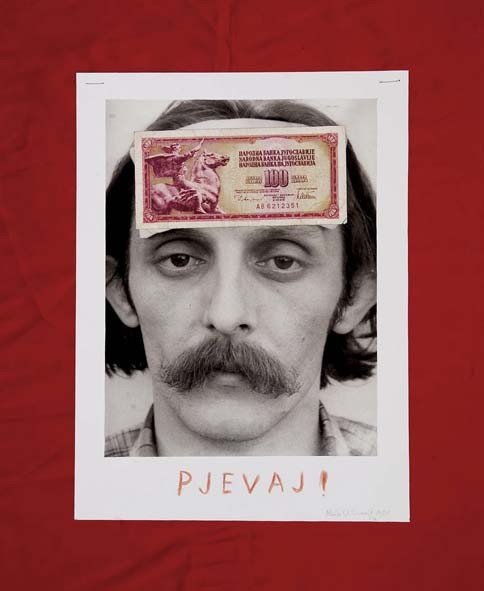Mladen Stilinovic
dal 16/9/2008 al 1/11/2008
Segnalato da
16/9/2008
Mladen Stilinovic
Galerie im Taxispalais, Innsbruck
In drawings, paintings, installations, objects, videos, texts and artist's books, Stilinovic investigates the codes and conditions of late socialist production and consumption. His interest focuses on the relations between the languages of art and ideology, which he questions and transforms by philosophical-poetic and ironic means.

Mladen Stilinovic is one of the most important contemporary artists from Croatia. His work is being presented for the first time in a solo exhibition at an Austrian art institution.
In drawings, paintings, installations, objects, videos, texts and artist’s books, Mladen Stilinovic investigates the codes and conditions of late socialist production and consumption. Stilinovic's interest focuses on the relations between the languages of art and ideology, which he questions and transforms by philosophical-poetic and ironic means.
From 1975 to 1979, Stilinovic – whose creative origins lay in experimental film and poetry – was a member of the Grupa Sestorice Autora (Group of Six Artists), who presented their exhibitions and performances on the streets of Yugoslavia’s cities. Stilinovic continues to pursue this experimental starting point – dealing with the examination of everyday (socialist) life – in his current work, in which he interweaves the increasingly precarious political situation after Tito’s death with the equally precarious position of art and the artist. Stilinovic links the real and symbolic decline in Tito’s power, the degeneration of a heroic cult into a cliché with the deterioration of the Modernist artistic language. His cycle “Exploitation of the Dead” (1984-90) is exemplary of this; Stilinovic uses poetic-ironic pictorial and linguistic inventions referring to Russian Constructivism, Socialist Realism and the geometric abstraction of the 1950s - all three being artistic tendencies and styles that experienced exploitation and depletion, thereby losing their artistic-symbolic significance.
After the fall of Communism, Stilinovic extended his investigations to include different artistic and social fields that defined life – and not only that of artists – under the auspices of the new political regime. One programmatic work dealing with this question is his self-reflective poster in attractive shades of pink, which bears the sentence “An Artist Who Cannot Speak English Is No Artist” (1994-96). By this means, Stilinovic subsumes into a brief, ironic phrase the dilemma of artists from former Eastern Bloc countries and their structural exclusion from, yet simultaneous (potential) participation in the Western art business and art market.
The exhibition shows a series of interlocking work complexes, e.g. on the topic of “Money” or, more recently, on the poverty of those “Bag People” who carry their few belongings in plastic bags hoping to sell them at informal markets.
The installation “Submit to Public Debate” presents the public with the hackneyed language of politics in both writing and sound; a scenario that conveys melancholy without being serious in a way quite characteristic of Stilinovic’s art.
“Some of my works talk about the colour white, pain, silence, nothing... Those are the works about emotional states of mind. How can I talk to myself about money? On the political or emotional level? Money is there, and there is not any. And we are here, the artists from the so-called East, but we are not. The question of pain is strictly an individual issue. It can be expressed only by the word ‘pain’. As one boring tautology. Such is life and such is art, linking things which are not interlinked. Money, pain, tautology.” (Mladen Stilinovic, 2004)
Mladen Stilinovic was born in Belgrade in 1947; he lives and works in Zagreb.
The exhibition is based on collaboration with Platform Garanti – Contemporary Art Center, Istanbul, Turkey, and the Van Abbemuseum, Eindhoven, Netherlands.
Thanks to:
Charles Esche
Vasif Kortun
Annemarie Türk and KulturKontakt Austria
Galerie im Taxispalais
Maria-Theresien-Str. 45 - A-6020 Innsbruck



